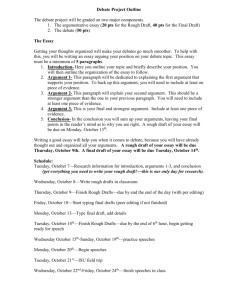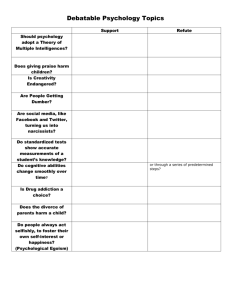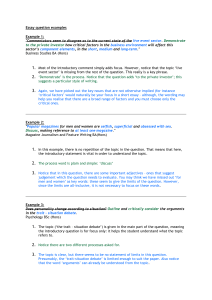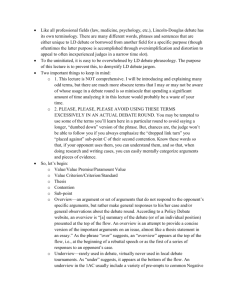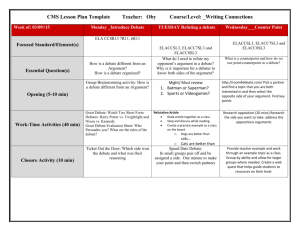LAW & JUSTICE DEBATE PROJECT OUTLINE (Fall 2013) Goals
advertisement
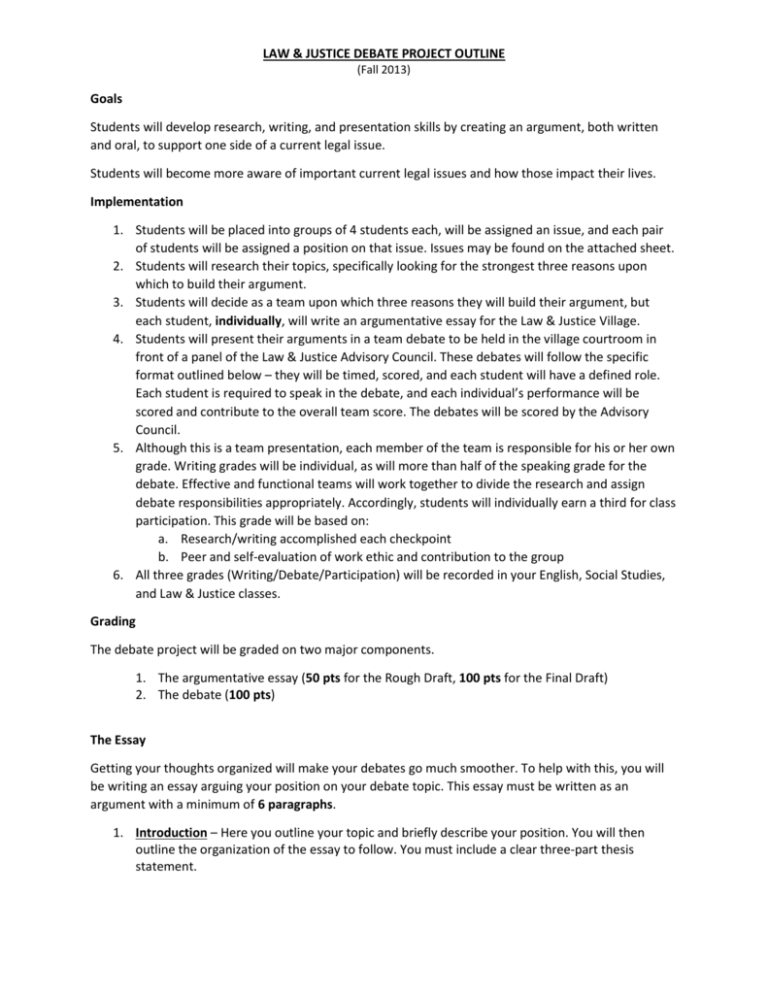
LAW & JUSTICE DEBATE PROJECT OUTLINE (Fall 2013) Goals Students will develop research, writing, and presentation skills by creating an argument, both written and oral, to support one side of a current legal issue. Students will become more aware of important current legal issues and how those impact their lives. Implementation 1. Students will be placed into groups of 4 students each, will be assigned an issue, and each pair of students will be assigned a position on that issue. Issues may be found on the attached sheet. 2. Students will research their topics, specifically looking for the strongest three reasons upon which to build their argument. 3. Students will decide as a team upon which three reasons they will build their argument, but each student, individually, will write an argumentative essay for the Law & Justice Village. 4. Students will present their arguments in a team debate to be held in the village courtroom in front of a panel of the Law & Justice Advisory Council. These debates will follow the specific format outlined below – they will be timed, scored, and each student will have a defined role. Each student is required to speak in the debate, and each individual’s performance will be scored and contribute to the overall team score. The debates will be scored by the Advisory Council. 5. Although this is a team presentation, each member of the team is responsible for his or her own grade. Writing grades will be individual, as will more than half of the speaking grade for the debate. Effective and functional teams will work together to divide the research and assign debate responsibilities appropriately. Accordingly, students will individually earn a third for class participation. This grade will be based on: a. Research/writing accomplished each checkpoint b. Peer and self-evaluation of work ethic and contribution to the group 6. All three grades (Writing/Debate/Participation) will be recorded in your English, Social Studies, and Law & Justice classes. Grading The debate project will be graded on two major components. 1. The argumentative essay (50 pts for the Rough Draft, 100 pts for the Final Draft) 2. The debate (100 pts) The Essay Getting your thoughts organized will make your debates go much smoother. To help with this, you will be writing an essay arguing your position on your debate topic. This essay must be written as an argument with a minimum of 6 paragraphs. 1. Introduction – Here you outline your topic and briefly describe your position. You will then outline the organization of the essay to follow. You must include a clear three-part thesis statement. LAW & JUSTICE DEBATE PROJECT OUTLINE (Fall 2013) 2. Argument 1 – This paragraph will be dedicated to explaining the first argument that supports your position. To back up this argument, you will need to include supporting evidence. 3. Argument 2 – This paragraph will explain your second argument. This should be a stronger argument than the one in your previous paragraph. You will need to include supporting evidence. 4. Argument 3 – This is your final and strongest argument. Include supporting evidence. 5. Refute the opposing side’s best argument. 6. Conclusion – In the conclusion you will sum up your arguments, leaving your final points in the reader’s mind as to why you are right. A rough draft of your essay will be due on November 11. Writing a good essay will help you when it comes to debate, because you will have already thought out and organized all your arguments. A rough draft of your essay will be due November 11. A final draft of your essay will be due November 22. Time Line September 25 – Roll out project September 30 – Turn in Partner/Topic Selection sheet October 2 – Receive final Partner/Topic assignment October 22 – Turn in an abstract of your topic which includes an overview of the arguments on each side of the issue. November 6 – 8 – Meet with an Advisory Council member and outline your argument. November 11 — Turn in Rough Drafts November 22 – Final Draft of Essay due December 5, 9-12 — Presentation of debates in the village courtroom The Debate The debates will follow an organized schedule and will be timed. The total time available for each debate will be 20 minutes. 1. The Opening: Each side will give an opening that explains what the issue is and what position their side supports. Remember, judges will be watching and listening, so you want to start strong and in a clear voice. 2. Arguments: Both sides will present arguments as to why their side has the best position. You will include the evidence that you found in your research to back up these arguments. 3. Rebuttal: Both sides will use rebuttals to attack the arguments given by the other side of the debate. Make sure to listen closely to your opponents and take notes if needed. 4. Closing: Each side will finish with a closing that sums up their arguments as to why their side holds the better position on the debate topic.
